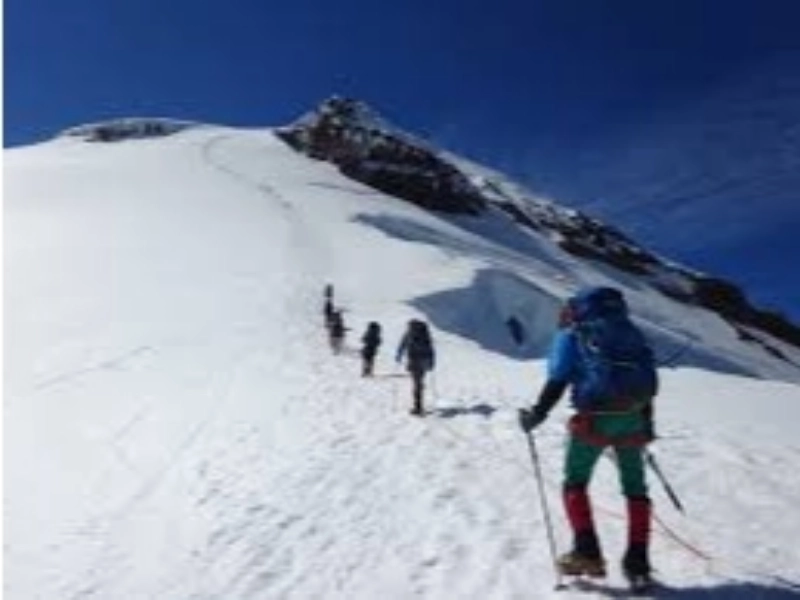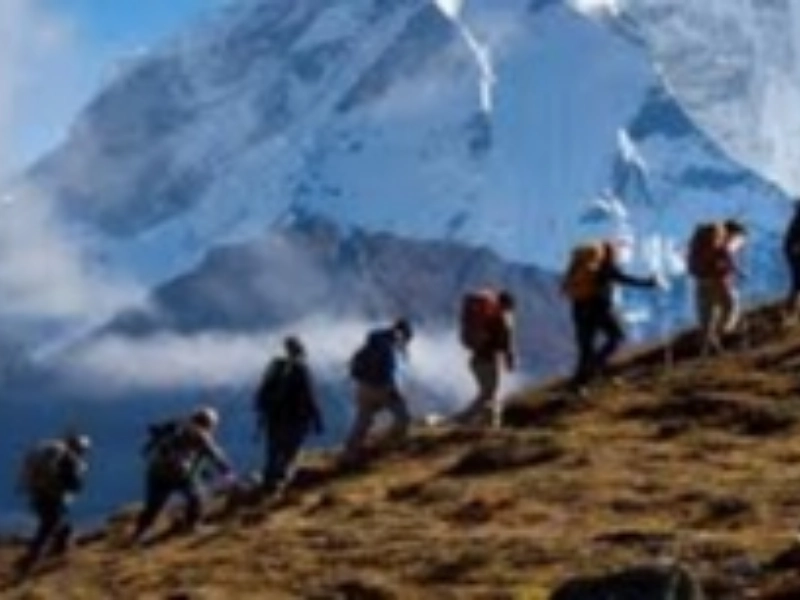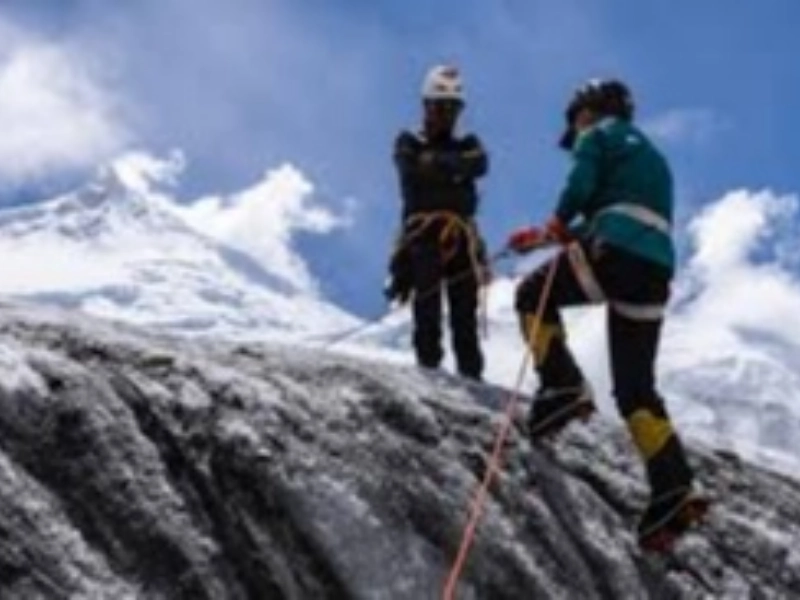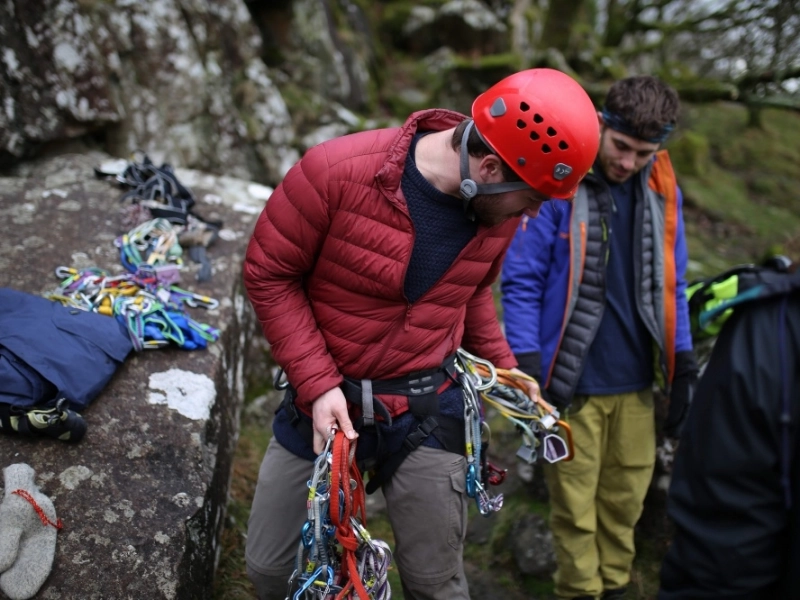Mountaineering is actually quite well suited to most individuals, despite its reputation as a difficult and even dangerous activity. This is because it offers a lot of health benefits to both your body and mind. Walking for extended periods of time improves your cardiovascular health while causing minimal impact on your joints. It improves balance and hand-eye coordination as well.
 Every muscle in your body must be used during the demanding workout of mountaineering. Your arms, legs, and core muscles can all be strengthened by this full-body workout, which will increase your overall fitness. In addition to lowering stress and elevating happiness, high-intensity exercise can also promote the release of "feel-good" hormones.
It also increases your range of motion. Being flexible is essential for preventing accidents when climbing, and the more flexible you are, the less discomfort you will feel after a climb.
You can develop interpersonal bonds through climbing as well. Climbing is a social sport because you typically do it with friends, family, or complete strangers. When times are hard on the mountain, teamwork and mutual support can keep you motivated.
Every muscle in your body must be used during the demanding workout of mountaineering. Your arms, legs, and core muscles can all be strengthened by this full-body workout, which will increase your overall fitness. In addition to lowering stress and elevating happiness, high-intensity exercise can also promote the release of "feel-good" hormones.
It also increases your range of motion. Being flexible is essential for preventing accidents when climbing, and the more flexible you are, the less discomfort you will feel after a climb.
You can develop interpersonal bonds through climbing as well. Climbing is a social sport because you typically do it with friends, family, or complete strangers. When times are hard on the mountain, teamwork and mutual support can keep you motivated.
 An increased heart rate lowers the risk of heart disease and aids in maintaining a healthy weight. Mountaineering is one type of regular exercise that might help build your muscles and raise your resting metabolic rate.
By supplying oxygen-rich blood to the rest of your body, mountain climbing, being a high-altitude sport, can raise your VO2 max and enhance your body's ability to function at altitude. For people who are worried about how high altitude can affect their health, this is really crucial.
Try activities like long-distance hiking and carrying a large pack up and down hills to help increase your VO2 max. This will enable you to adapt to the circumstances of your upcoming mountaineering expedition. You may train your core and balance to support yourself more effectively when you need to move fast or change your center of gravity.
An increased heart rate lowers the risk of heart disease and aids in maintaining a healthy weight. Mountaineering is one type of regular exercise that might help build your muscles and raise your resting metabolic rate.
By supplying oxygen-rich blood to the rest of your body, mountain climbing, being a high-altitude sport, can raise your VO2 max and enhance your body's ability to function at altitude. For people who are worried about how high altitude can affect their health, this is really crucial.
Try activities like long-distance hiking and carrying a large pack up and down hills to help increase your VO2 max. This will enable you to adapt to the circumstances of your upcoming mountaineering expedition. You may train your core and balance to support yourself more effectively when you need to move fast or change your center of gravity.
 You learn via mountain climbing that certain elements in life, such as the weather or other circumstances, are beyond your control. Having this knowledge can make it easier for you to live a balanced life. In addition, it might help you develop empathy for the difficulties faced by others, which is a positive outlook.
Having friends who are also interested in mountaineering is vital because climbing is a social sport. You can search for nearby climbing communities and clubs, or you can join online groups to connect with a larger community. It's also possible to ask other climbers to serve as your mentor. You can learn more about the sport and hone your talents by doing this. Additionally, climbing with a friend is safer than climbing alone.
You learn via mountain climbing that certain elements in life, such as the weather or other circumstances, are beyond your control. Having this knowledge can make it easier for you to live a balanced life. In addition, it might help you develop empathy for the difficulties faced by others, which is a positive outlook.
Having friends who are also interested in mountaineering is vital because climbing is a social sport. You can search for nearby climbing communities and clubs, or you can join online groups to connect with a larger community. It's also possible to ask other climbers to serve as your mentor. You can learn more about the sport and hone your talents by doing this. Additionally, climbing with a friend is safer than climbing alone.
 It takes a lot of strength and endurance to be a mountaineer. You'll probably be at high altitudes where oxygen is scarcer, requiring a lot of climbing and elevation gain over ten to twenty-hour days while carrying a bulky pack on your back.
To build the arm and leg strength necessary to lift a large load, many climbers prepare for their excursions by going on treks while wearing a backpack and by participating in indoor or outdoor climbing. By attending a course or going on a few trips with a mountain guide, they also pick up the technical skills they'll need for their trip.
As a result of spending so much time together during climbs, mountaineers develop enduring friendships with other intrepid travelers. These connections can provide support when one is faced with obstacles outside of one's comfort zone.
It takes a lot of strength and endurance to be a mountaineer. You'll probably be at high altitudes where oxygen is scarcer, requiring a lot of climbing and elevation gain over ten to twenty-hour days while carrying a bulky pack on your back.
To build the arm and leg strength necessary to lift a large load, many climbers prepare for their excursions by going on treks while wearing a backpack and by participating in indoor or outdoor climbing. By attending a course or going on a few trips with a mountain guide, they also pick up the technical skills they'll need for their trip.
As a result of spending so much time together during climbs, mountaineers develop enduring friendships with other intrepid travelers. These connections can provide support when one is faced with obstacles outside of one's comfort zone.
 Physical and mental flexibility are essential for climbing. Training in strength, balance, endurance, and flexibility is required. Additionally, a solid grasp of navigation and mountain weather is required. You also need to have a solid plan and be able to carry it out well under pressure.
Like any endurance sport, climbing primarily depends on the aerobic metabolic system to provide the muscles that are used for work with oxygen. Due to this, it is crucial to practice on terrain that is similar to that of climbing, such as extended treks uphill. To do this, you can utilize incline trainers, stadium steps, or stair machines.
It's best to start slowly, just like with any fitness program. Especially for mountaineering, where major injuries can occur. This is why it's advised to hike without a weighted backpack at first, then increase the weight gradually as you gain experience.
Physical and mental flexibility are essential for climbing. Training in strength, balance, endurance, and flexibility is required. Additionally, a solid grasp of navigation and mountain weather is required. You also need to have a solid plan and be able to carry it out well under pressure.
Like any endurance sport, climbing primarily depends on the aerobic metabolic system to provide the muscles that are used for work with oxygen. Due to this, it is crucial to practice on terrain that is similar to that of climbing, such as extended treks uphill. To do this, you can utilize incline trainers, stadium steps, or stair machines.
It's best to start slowly, just like with any fitness program. Especially for mountaineering, where major injuries can occur. This is why it's advised to hike without a weighted backpack at first, then increase the weight gradually as you gain experience.